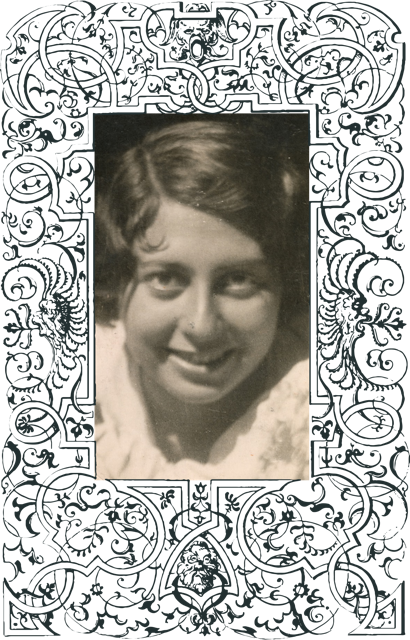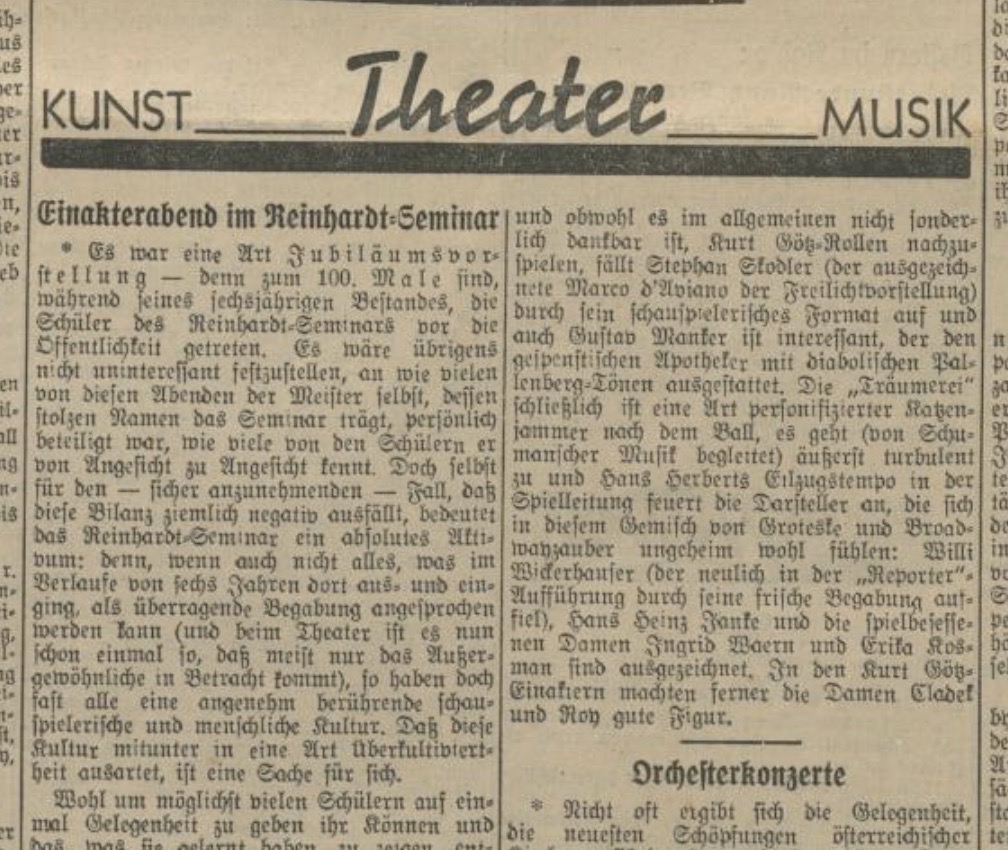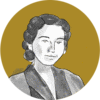Vienna, 12 July 1935
Women Conquer the
Male-Dominated Field of Directing –
The Discovery of a Brilliant Young Talent
A portrait of the promising young director Henny Pia Herzer by Isabelle Wirth

© Stadtmuseum Bad Ischl
Not Only the Daughter of ...
It would not be at all surprising if Henny Pia Herzer, born in 1915 as the sole daughter of librettist Ludwig Herzer and the niece of composer Camilla Frydan, had been inherently imbued with a passion for music. The mode of artistic expression she chose was not, however, within the world of music, but behind the theatre’s curtains, where she could excel as a director. While Herzer cannot be separated from her family background, nor should she be solely defined by it. She is far too talented and self-assured for such limitations.
She confidently takes her place as a visionary directing student at the Schönbrunn Acting and Directing Seminar, equally at home on, in front of, and behind the stage, proving herself every bit as capable as her male peers. Her success in the male-dominated realm of directing is not due solely to her charm or professionalism, but also to her artistic talent and a strategic use of assertiveness when required. However, within the creative ambiance of the Schönbrunn Acting and Directing Seminar, it seems that such tactics are hardly necessary. Herzer is respected and well-liked by all. Her personality shines through in her direction of Hund im Hirn (‘Dog in the Brain’) by Curt Goetz.
The Woman Behind the Play
The immediate result of the premiere of Hund im Hirn was a room filled with hilarity, faces practically swimming in a sea of laughter-induced tears, and applause that seemed to go on forever. The audience’s mood was so joyous that it was almost as if they departed with newly developed laughing muscles. It’s understandable that Herzer’s name is quickly becoming synonymous with the established directors of our time. It’s truly remarkable considering this emerging talent is only twenty years old, began her training just a year ago, and is still in the midst of it. In the coming year, she will surely emerge as a fully trained director with the potential to establish herself in all of this city’s theatres, continuing to engage and entertain audiences with her productions. Herzer boasts an extensive repertoire of skills and has an uncommon chance at a career path that is predominantly reserved for men.
g

Source: ANNO/Austrian National Library
None of the Men
Herzer not only excels as a promising directing student but also as a woman in the world of the arts, serving as a reminder that attributes like hard work, artistic integrity, and a good sense of humour are not limited by gender. Even though the number of women at the Schönbrunn Acting and Directing Seminar is alarmingly low, it’s important to note that there are several influential female faculty members, including actress Margit von Tolnai and Germanist Gertrud Lasch. Herzer also has a small group of female classmates who are studying directing, with the first among them being American student Beverly Wright.
A Bright Future
It is to be hoped that the Schönbrunn Acting and Directing Seminar, as well as the entire theatre industry, will open its doors to more female artists. Herzer is living proof that women possess the same talent and work ethic as men, allowing them to captivate an audience with their productions. When one observes the directing student at work, her attentive nature consistently shines through. You can see how joy lights up her intelligent eyes. Henny Pia Herzer is unquestionably a name worth remembering.
‘You see, when you are young, everything is fun and nothing is really tragic.’
n
Henny Pia Herzer
Henny Pia Herzer
born 11 July 1915, Vienna
died 7 March 2004, Melbourne
Biography
Henny Pia Herzer was born in Vienna on 11 July 1915, the only child of the librettist Ludwig Herzer (1872–1939) and his wife Ella (née Königsberger, 1882–1958). She recognized her own artistic talent early on and wanted to fuel it by studying directing at Max Reinhardt’s renowned Schönbrunn Acting and Directing Seminar. Her father was against her choice of studies and wanted to forbid it, so Henny ran away from home.
On 1 October 1936, she became a member of the Ring of Austrian Stage Artists through her directorial work. Her aptitude for the field was confirmed on 6 October 1936, when she passed the exam for directorship. Even before this, in 1935, she had started participating in various productions, such as the production Vom Konzertlied zum Schlager (‘From Concert Song to Hit Song’), which was performed in co-production with her aunt Camilla Frydan at the Wiener Frauenclub. In the same year Henny directed the play Hund im Hirn (‘Dog in the Brain’) by Curt Goetz (1888–1960) and received compliments in the papers for the ‘very brisk staging’ and the ‘appropriate handling of the gallant age’. In the following years she worked at various theatres, such as the Theater in der Josefstadt. In order to be allowed to pursue her profession she had to use a pseudonym.
g
On 8 August 1938, Henny illegally fled, with her fiancé Hans Egon Arnheim (1885–1945), to St. Gallen in Switzerland. Her parents followed her in early December of 1938. Her father Ludwig died after five months in exile and her mother returned to Vienna. Henny’s Swiss residence permit expired in May 1939. On 28 June of the same year, she emigrated to Shanghai, where she participated in a play produced by the American Dramatic Society. During the first years of World War II, Henny lived in precarious circumstances, which were complicated by the gambling addiction of her partner Arnheim. Henny separated from him and reunited with a childhood acquaintance, Fritz-Peter Bauer (?–1957), whom she married in 1941. From 1948 to 1949 Henny worked as a nurse in a hospital for refugees and became pregnant by a doctor.
The Bauers emigrated to Melbourne in 1949, where Henny gave birth to her daughter Linda, who died after five weeks. In Australia, the couple set up their own lighting company called Rite Lite, which is still very successful. On 6 January 1956, their son Ronald Louis Bauer was born, although her husband was not the biological father, due to his inability to conceive. In April 1957 Fritz-Peter Bauer died. Twenty years later, Henny joined her son in the jewellery store Klepner’s – Fine Antique Jewellery & Valuers, where Ronald is still a director today. Henny Pia Herzer died on 7 March 2004 in Melbourne, at the age of 88.
What remains?
k
Henny Pia Herzer is one of the subjects of the exhibition ‘Max Reinhardt Seminar 1928 to 1945’, co-curated by Peter Roessler and currently on display at the Max Reinhardt Seminar (which today is the School of Drama at the University of Music and Performing Arts in Vienna). Here, for the first time in Austria, Herzer’s life as a directing student in Vienna in the 1930s was remembered. At the age of 80, she told the story of her forced expulsion and exclusion in March 1938, in a 90-minute interview with the USC Shoah Foundation:
© USC Shoa Foundation
‘But before then, things became very uncomfortable in Vienna. And they had this wonderful idea of letting the Jews scrubbing streets. They took them out of their houses, and they had to scrub the pavement. Or they took them to party offices, and you had to scrub the floor there. And one day, they came to our place and wanted to take my parents and myself. And my father said, may I put on a different coat? And took his other coat, with all his decorations from the war. And in those days, they were still not as bad as later on. They let my parents go, but I had to stay. So, the SA man there said, look, scrub this floor.
. I said, I don’t mind any work, but I’ve never done it before. If you show me how to do it, I’ll be very happy to do it. And the stupid man went on his knees and started scrubbing. And he said, see? I said, I still haven’t got it. Can you show me more? And I made him scrub the whole floor there and I was snickering to myself. But the tragic thing was, in the next room was an old man, an old Jew, and he was crying and sobbing.
And I said to him, for goodness sake. Shut up. Smile. Don’t show them that you’re – but he was so disconcerted. Well, when the floor was finished, he said, now you can wash the windows. I said I only saw when our housekeeper washed the windows. She had a bucket, and she had special soap. Do you mind if I ring home and I tell her to bring all the goodies? He said, no. And I rang – I knew that this person was the one who got the Nazis. She told them that we had communist people in our house.
So, I said to her, Kathi, would you please come to the office here with a bucket and everything? And I made her wash all the windows. So, I didn’t do a thing. And then when – and they were very polite to me. And when I came home, we had dinner. And I said to my parents so that she could hear, and you know what this nice SA men said to me? People that have accused other people with a lie, they will get a very big punishment. And that poor woman half died when she heard that. See, if you’re young, everything is fun and nothing is really tragic.’
g


